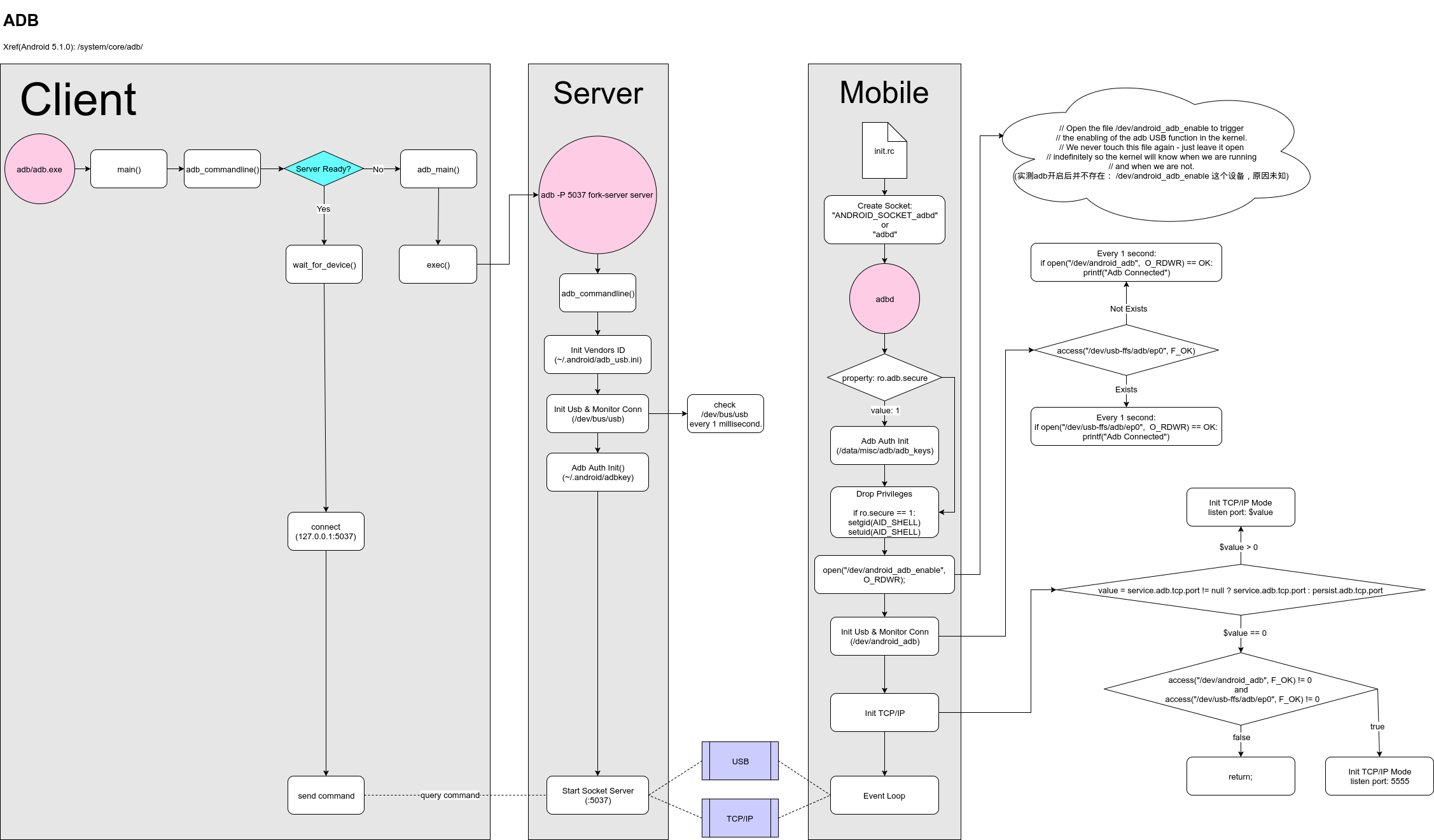adb debug
Adb(Android-Debug-Bridge)是为了方便Host与目标Android设备通讯而出现的一种套件,支持USB与TCP/IP的通讯的方式。 Adb分为三个端:Client & Server & Mobile。Adb的部分源代码是混在一起的,很多部分的功能可以重用,各端独立的逻辑使用预编译指令来分隔离。 源码中通常使用预编译定义ADB_HOST来表示PC上的代码,其他#else块中表示Mobile代码,其他的表示为3端共享的代码。
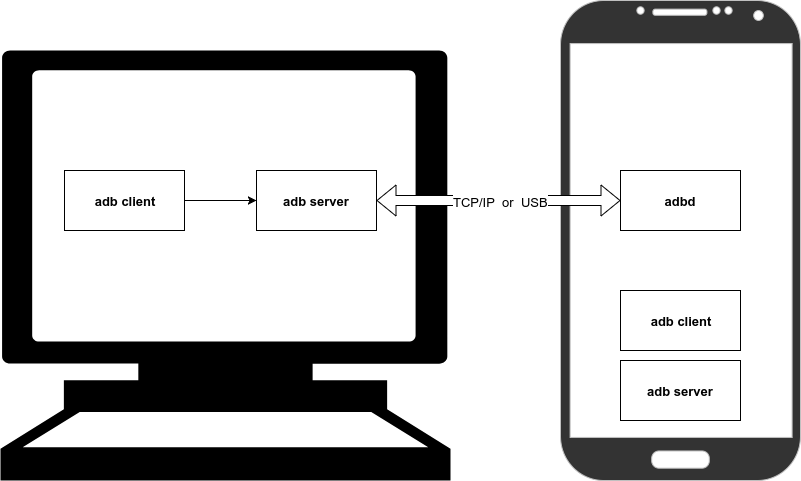
adbd
shell 1706 1 27572 656 poll_sched 0000000000 S /sbin/adbd
源码
system/core/adb/daemon/main.cpp
int adbd_main(int server_port) {
// adbd socket
init_transport_registration();
// We need to call this even if auth isn't enabled because the file
// descriptor will always be open.
adbd_cloexec_auth_socket();
// adbd启动后,读取ro.adb.secure,决定是否要求PC进行PublicKey+Token认证.
if (ALLOW_ADBD_NO_AUTH && property_get_bool("ro.adb.secure", 0) == 0) {
auth_required = false;
}
adbd_auth_init();
// 降低权限到shell
drop_privileges(server_port);
// 当存在/dev/android_adb或/dev/usb-ffs/adb/ep0时, 先预设为USB模式
bool is_usb = false;
if (access(USB_ADB_PATH, F_OK) == 0 || access(USB_FFS_ADB_EP0, F_OK) == 0) {
// Listen on USB.
usb_init();
is_usb = true;
}
// 若port不为0,则使用TCP/IP模式,否则维持USB模式.
// If one of these properties is set, also listen on that port.
// If one of the properties isn't set and we couldn't listen on usb, listen
// on the default port.
char prop_port[PROPERTY_VALUE_MAX];
property_get("service.adb.tcp.port", prop_port, "");
if (prop_port[0] == '\0') {
property_get("persist.adb.tcp.port", prop_port, "");
}
int port;
if (sscanf(prop_port, "%d", &port) == 1 && port > 0) {
D("using port=%d", port);
// Listen on TCP port specified by service.adb.tcp.port property.
local_init(port);
} else if (!is_usb) {
// Listen on default port.
local_init(DEFAULT_ADB_LOCAL_TRANSPORT_PORT);
}
D("adbd_main(): pre init_jdwp()");
init_jdwp();
D("adbd_main(): post init_jdwp()");
D("Event loop starting");
// 开启socket并开启事件循环,接受Client连接和发来的命令
fdevent_loop();
return 0;
}
static bool should_drop_privileges() {
#if defined(ALLOW_ADBD_ROOT)
char value[PROPERTY_VALUE_MAX];
// The properties that affect `adb root` and `adb unroot` are ro.secure and
// ro.debuggable. In this context the names don't make the expected behavior
// particularly obvious.
//
// ro.debuggable:
// Allowed to become root, but not necessarily the default. Set to 1 on
// eng and userdebug builds.
//
// ro.secure:
// Drop privileges by default. Set to 1 on userdebug and user builds.
property_get("ro.secure", value, "1");
bool ro_secure = (strcmp(value, "1") == 0);
property_get("ro.debuggable", value, "");
bool ro_debuggable = (strcmp(value, "1") == 0);
// Drop privileges if ro.secure is set...
bool drop = ro_secure;
property_get("service.adb.root", value, "");
bool adb_root = (strcmp(value, "1") == 0);
bool adb_unroot = (strcmp(value, "0") == 0);
// ... except "adb root" lets you keep privileges in a debuggable build.
if (ro_debuggable && adb_root) {
drop = false;
}
// ... and "adb unroot" lets you explicitly drop privileges.
if (adb_unroot) {
drop = true;
}
return drop;
#else
return true; // "adb root" not allowed, always drop privileges.
#endif // ALLOW_ADBD_ROOT
}
相关属性
// adb 连接模式
service.adb.tcp.port // 0为USB调试
persist.adb.tcp.port
// adb 调试用户验证
[ro.adb.secure]: [1] // 需要弹框勾选授权
// usb上所有支持的功能
[sys.usb.state]: [mtp,adb]
// Adbd 是否运行中
[init.svc.adbd]: [running]
// userdebug
[ro.debuggable]: [1]
[ro.secure]: [1]
// vold
[vold.decrypt]: [trigger_restart_framework]
// The persistent property which stores whether adb is enabled or not.
// May also contain vendor-specific default functions for testing purposes.
[persist.sys.usb.config]:[mtp,adb]
Framework
Usb Debugging Init
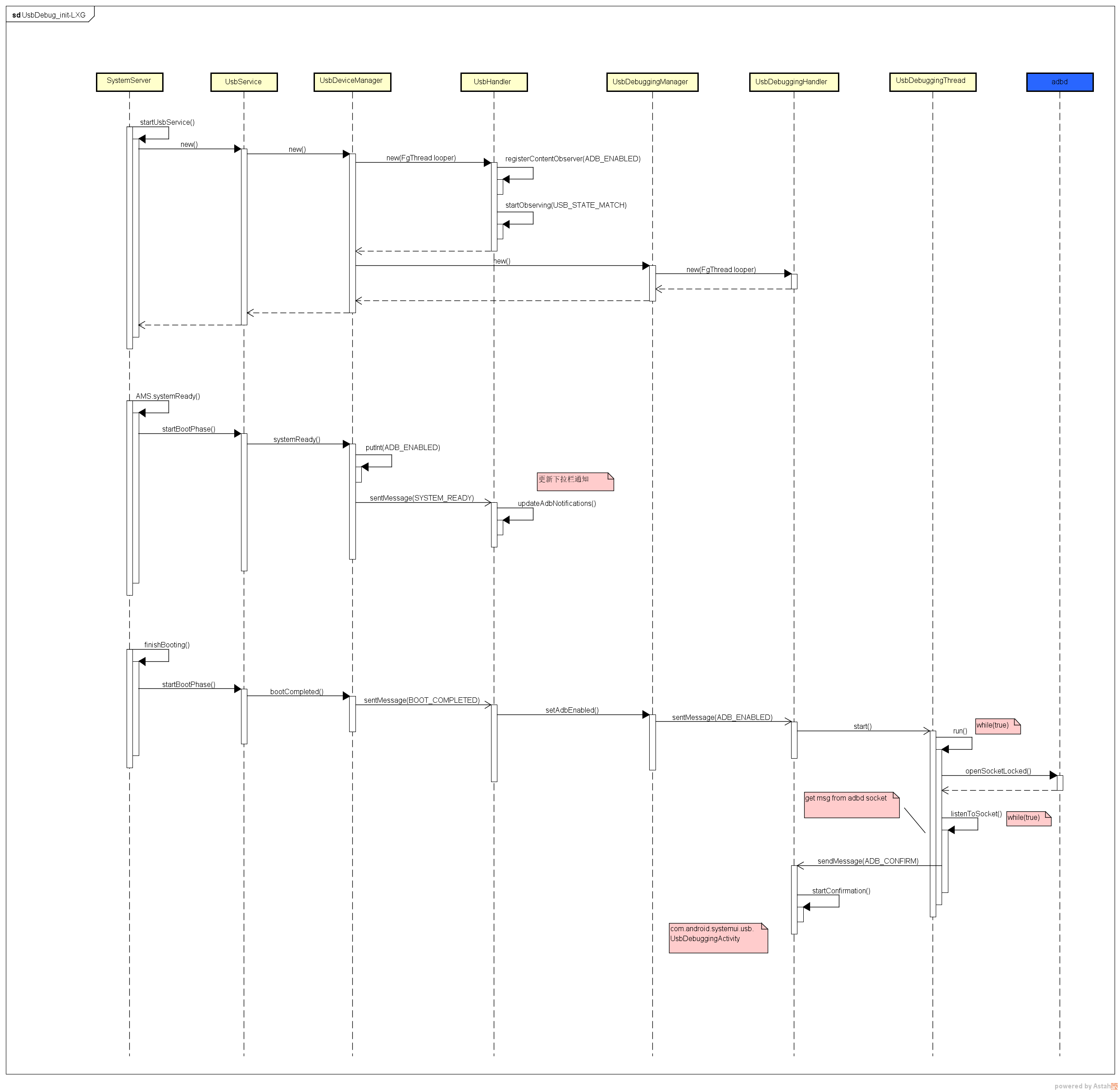
手动打开USB调试
在Android中,当Mobile通过USB连接到PC后,到底开启哪些功能(如:adbd、midi、mtp等) 都是由UsbDeviceManager来做总控的。 而UsbDeviceManager对这些功能控制的方式就是通过修改property。adbd会根据相关preoperty项作出相应操作,从而决定是否被打开。 那么adbd是如何响应property的更改呢? 这主要依赖init.usb.rc或init.*.usb.rc在一开机就注册好的property事件,当指定的property项如sys.usb.config的值被设为mtp,usb时,就会触发启动adbd的命令。
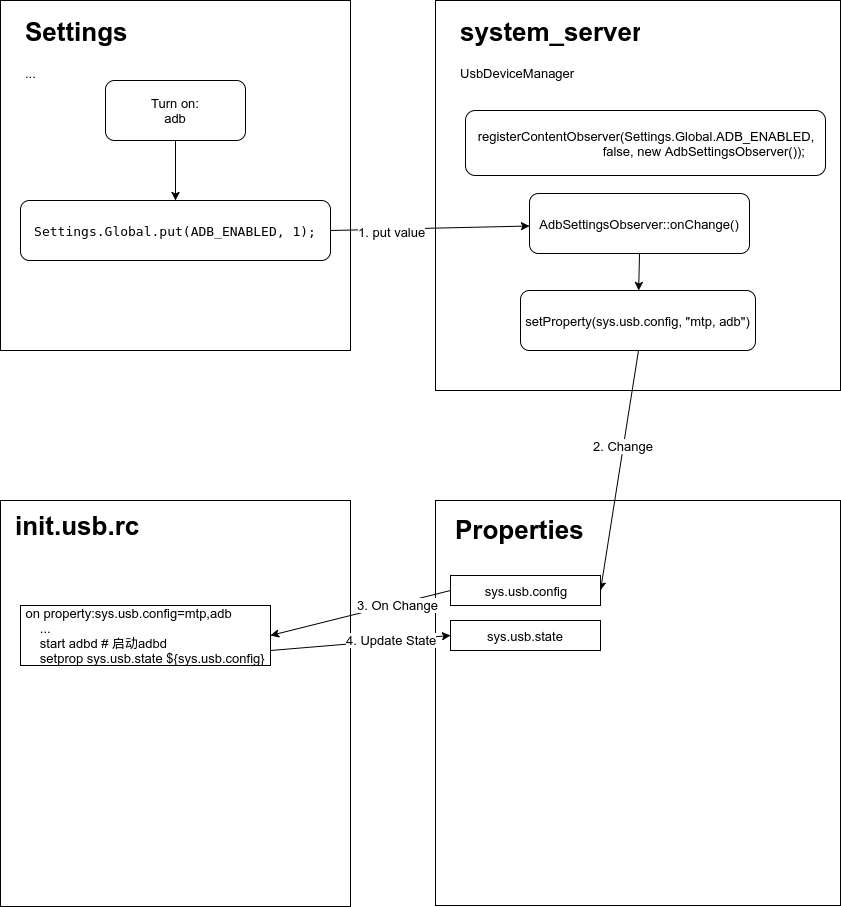
system/core/rootdir/init.usb.rc
on post-fs-data
chown system system /sys/class/android_usb/android0/f_mass_storage/lun/file
chmod 0660 /sys/class/android_usb/android0/f_mass_storage/lun/file
chown system system /sys/class/android_usb/android0/f_rndis/ethaddr
chmod 0660 /sys/class/android_usb/android0/f_rndis/ethaddr
mkdir /data/misc/adb 02750 system shell
mkdir /data/adb 0700 root root
# adbd is controlled via property triggers in init.<platform>.usb.rc
service adbd /sbin/adbd --root_seclabel=u:r:su:s0
class core
socket adbd stream 660 system system
disabled
seclabel u:r:adbd:s0
# adbd on at boot in emulator
on property:ro.kernel.qemu=1
start adbd
on boot
setprop sys.usb.configfs 0
# Used to disable USB when switching states
on property:sys.usb.config=none && property:sys.usb.configfs=0
stop adbd
write /sys/class/android_usb/android0/enable 0
write /sys/class/android_usb/android0/bDeviceClass 0
setprop sys.usb.state ${sys.usb.config}
# adb only USB configuration
# This is the fallback configuration if the
# USB manager fails to set a standard configuration
on property:sys.usb.config=adb && property:sys.usb.configfs=0
write /sys/class/android_usb/android0/enable 0
write /sys/class/android_usb/android0/idVendor 18d1
write /sys/class/android_usb/android0/idProduct 4EE7
write /sys/class/android_usb/android0/functions ${sys.usb.config}
write /sys/class/android_usb/android0/enable 1
start adbd
setprop sys.usb.state ${sys.usb.config}
........................................................
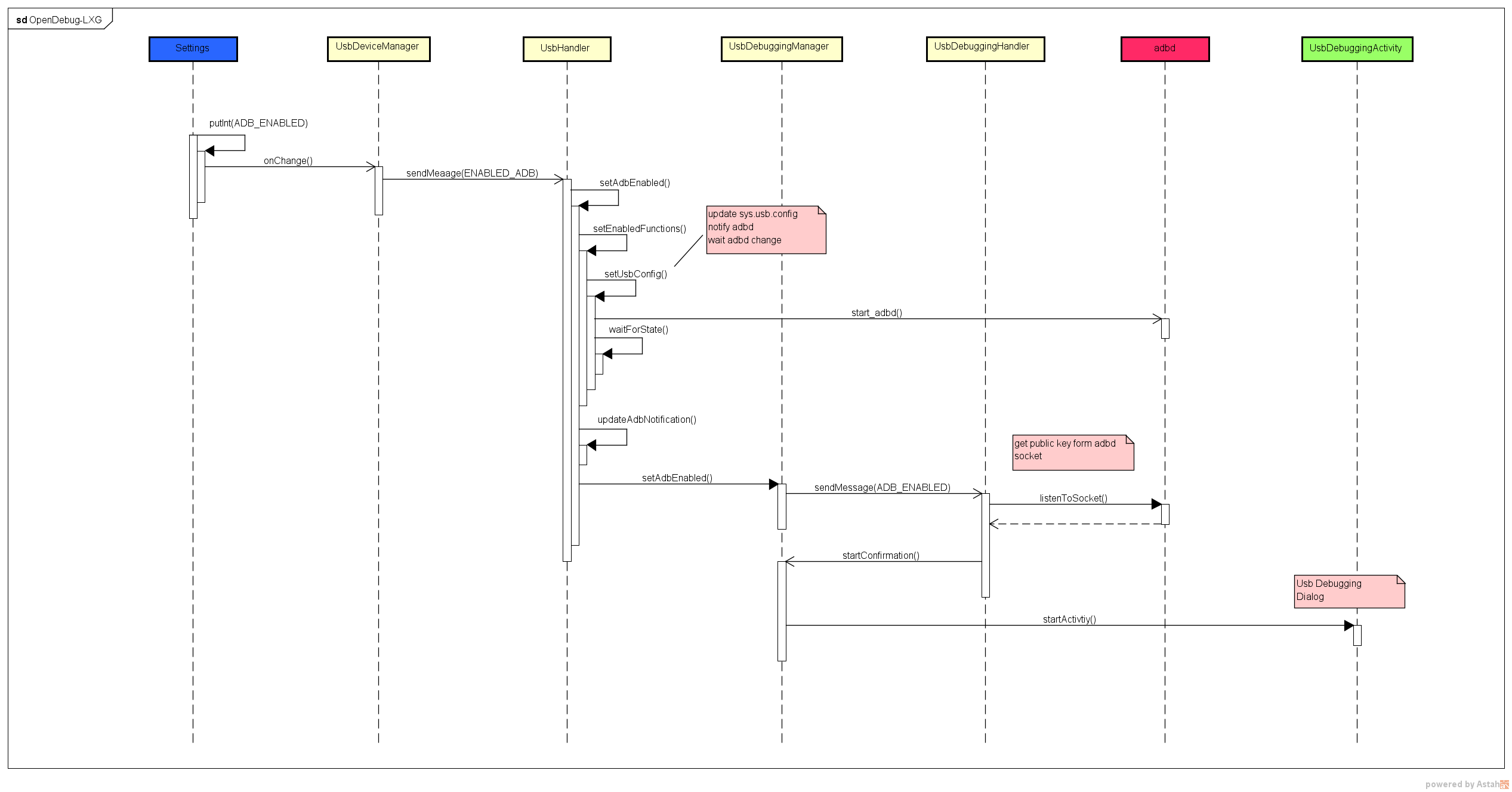
Adbd 与 Server 的授权过程
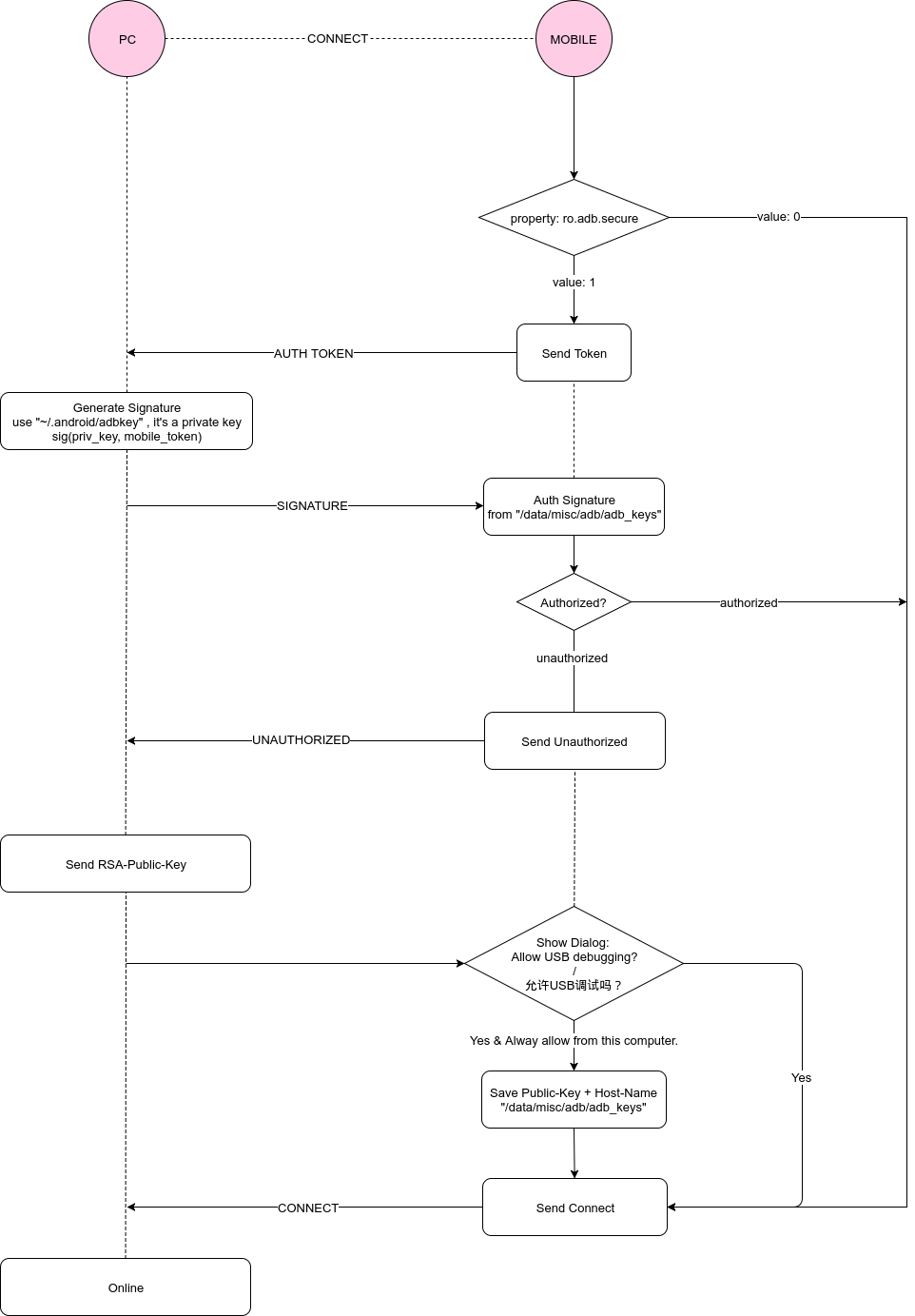
dumpsys 调试
adb shell dumpsys usb
USB Manager State:
USB Device State:
mCurrentFunctions: adb
mCurrentFunctionsApplied: true
mConnected: true
mConfigured: true
mUsbDataUnlocked: false
mCurrentAccessory: null
mHostConnected: false
mSourcePower: false
mSinkPower: true
mUsbCharging: true
Kernel state: CONFIGURED
Kernel function list: diag,serial,rmnet,ffs
USB Debugging State:
Connected to adbd: true
Last key received: 7E:F2:DF:CF:2F:04:02:63:36:BF:EF:D2:7B:B1:E1:85
User keys:
IOException: java.io.FileNotFoundException: /data/misc/adb/adb_keys (No such file or directory)
System keys:
IOException: java.io.FileNotFoundException: /adb_keys (No such file or directory)
USB Host State:
USB Port State:
otg_default: port=UsbPort{id=otg_default, supportedModes=dual}, status=UsbPortStatus{connected=true, currentMode=ufp, currentPowerRole=sink, currentDataRole=device, supportedRoleCombinations=[source:host, sink:device]}, canChangeMode=true, canChangePowerRole=false, canChangeDataRole=false
USB Audio Devices:
USB MIDI Devices:
Settings for user 0:
Device permissions:
Accessory permissions:
Device preferences:
Accessory preferences:
小结
